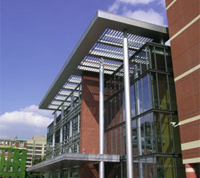Three Families Give $7.5 Million to BMC
Money funds cancer care facility for disadvantaged

Three years ago, administrators at Boston Medical Center hammered out a plan to create a cancer and ambulatory care facility that would provide high-quality care to the economically disadvantaged people who make up a large percentage of the center’s patients. The result — the $119 million, 133,497-square-foot Moakley Building — is BMC’s largest expansion project to date.
Federal funds and philanthropic donations provided more than 60 percent of the money needed for the project. Three families contributed $7.5 million of the $51 million in private donations — by far the largest gifts to the fundraising campaign.
“These families represent the very best of our citizenry, who are not only willing to make sure that everyone gets the best shot at the American dream, but more so, who feel that it is their duty to be affirmative and proactive about it,” says Norman Stein, vice president of development at BMC. “They didn’t wait to be asked for their support or for their help — they helped lead the charge.”
The Moakley Building, named after the late Congressman John Joseph Moakley, streamlines care by consolidating the diagnostic and cancer treatments that were scattered across the 16-square-block Medical Campus. The latest equipment and technology supplement the services offered, including the diagnosis and treatment of cancer and digestive and otolaryngology disorders, a breast health center, and an ambulatory surgery center.
“All patients receive the most advanced, coordinated, and dignified medical care available anywhere,” says Elaine Ullian, president and CEO of BMC. “We are proudly and passionately setting a new standard in a city known worldwide for its medical leadership.”
Stein says that financial contributors were interested in supporting a facility that would alleviate cancer care disparities among Boston’s disadvantaged population. Cancer is the leading cause of death in Boston, according to BMC, and disproportionately affects minorities and new immigrants, who make up the majority of the hospital’s patients.
“Donors recognized that BMC was the one institution that could really have an impact in creating a healthier Boston for underserved residents and that the Moakley building was a critical piece of that strategy,” says Stein. “It continues to be remarkable to the clinicians and the leadership and staff that so many people, in particular the families named, are so readily willing and able to step forward with very meaningful support even though they themselves won’t benefit.”
The three families making the largest individual donations are Alan Solomont, BMC board of trustees vice chair, and his wife, Susan Lewis Solomont, cochair of BMC’s Friends of Women’s Health, whose $1.5 million donation established the Solomont Center for Hematology and Medical Oncology; Joe Dempsey and his family, who contributed $3.5 million to create the Dempsey Center for Digestive Disorders, which treats digestive disorders, including inflammatory bowel disease, acid reflux and esophageal disorders, gastrointestinal cancers, and liver disease; and Steve and Joan Belkin, who gave $2.5 million for the Belkin Breast Health Center, which offers diagnosis, support, and treatment for breast cancer patients.
“Consolidating and coordinating patient care is a lot easier if we are all in one place. The building will provide synergy between practitioners,” says Michael Stone, a School of Medicine professor of surgery and chief of surgical oncology at BMC. “Every part of the building has been designed to help reduce patient stress, but at the same time it reinforces that they are going to get the very best care.”
Meghan Noe can be reached at mdorney@bu.edu.